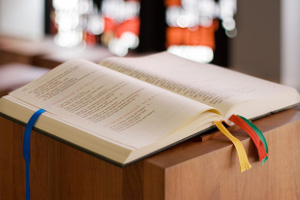 “Who set me to be a judge over you?” is Jesus surprising and fascinating answer when somebody asks help with sharing an inheritance.
“Who set me to be a judge over you?” is Jesus surprising and fascinating answer when somebody asks help with sharing an inheritance.
I want to interrupt the text and call out: “God”; God set Jesus as judge over us or did I misunderstand?
Luke himself confirms this later on in Acts 10 (42) when Peter explains the good news to Cornelius he says of Jesus: “… he is the one ordained by God as judge of the living and the dead”; although Peter (or Luke) might here only be referring to Jesus Christ after the resurrection.
Of course our text today is set before the resurrection. Does Jesus ask the question to verify how seriously his suggestions will be taken? Does Jesus not see himself as a judge? Jesus goes on not to judge between the person and his brother but to judge the possible greed that underlies the question.
It is a shame that the NRSV translation is not consistent in its translation of ‘soul’ (psuche). In verse 19 it translates ‘soul’ but in verse 20 ‘life’ for the same word. The ambiguity of the Greek texts asks us: what happens to your soul when you store up an abundance of possessions? And of course: who is the judge of that? Jesus’ advice is crystal clear: “Sell your possessions” (33).
31 July 2016
Luke 12:13-21
This weekly blog on one of the lectionary readings is by Anne Claar Thomasson-Rosingh, Programme Leader for Lifelong Learning at Sarum College.

Leave a Reply